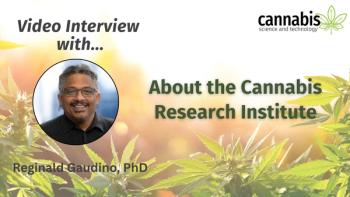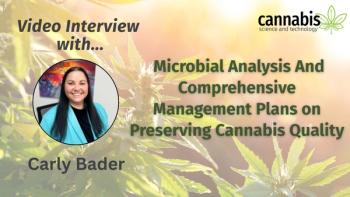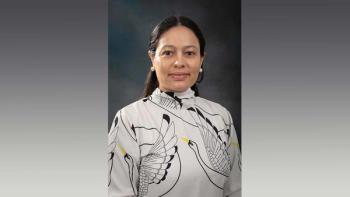
Cannabis Science and Technology
- Higher Education: Academic Perspectives on Cannabis
- Pages: 7-9
Inside the University of Maryland School of Pharmacy’s Graduate Program in Medical Cannabis

Leah Sera, PharmD, MA, the co-program director for the University of Maryland School of Pharmacy’s Graduate Studies in Medical Cannabis program sat down with Cannabis Science and Technology to discuss higher education in medical cannabis.
In 2019, the University of Maryland School of Pharmacy launched the
Cannabis Science and Technology caught up with Leah Sera, PharmD, MA, co-program director for the University of Maryland School of Pharmacy’s Graduate Studies in Medical Cannabis Program. Sera is also an associate professor of practice, sciences, and health outcomes research at the school.
How did you become the co-program director of the University of Maryland School of Pharmacy’s Graduate Studies in Medical Cannabis program? What is your own experience in the cannabis industry?
Dr. Leah Sera: In 2017, our dean at that time, Dr. Natalie Eddington, announced that she wanted to develop a Master’s program in medical cannabis. I was interested in medical cannabis, because in my clinical practice as a palliative care pharmacist, I had received questions about it from patients and caregivers. It sounded innovative and I asked my department chair to put in a word with the dean on my behalf, so that I could perhaps teach a course in the program. After meeting with the dean and sharing some of my ideas, I was given the opportunity to develop and implement the program as director.
What led to the starting of the program and how has it evolved over the past 5 years?
Dr. Sera: The idea to start this graduate program came about because a number of studies had been published around 2017 surveying healthcare providers about their medical cannabis knowledge. The results of those studies were largely that although more patients were asking about it, healthcare providers weren’t trained to answer their questions and hadn’t received any education about it in their medical, nursing, or pharmacy school curricula. At the same time, states were legalizing medical cannabis, and the industry was rapidly growing and evolving. We saw a knowledge gap that we felt we could address with a formalized academic program.
How does the MS in Medical Cannabis Science and Therapeutics (MCST) and Graduate Certificate in Medical Cannabis Science, Therapeutics, and Policy, at the School of Pharmacy differ from one another?
Dr. Sera: The MS program is a two-year, 30-credit Master’s program, while the Graduate Certificate is a one-year, 12-credit program. The certificate curriculum consists of four courses, which are also the first four courses in the MS program. It’s easy for students to start with the certificate and transition to the MS if they wish to continue their studies.
Can you tell us more about the courses and instructors?
Dr. Sera: Our curriculum provides comprehensive instruction on the science of the cannabis plant and how it affects the human body; interpreting the medical evidence that currently exists regarding the therapeutic effects of cannabis; and the complex regulatory landscape of state and federal cannabis policy in the U.S. Our faculty are both full-time professors at the School of Pharmacy and adjuncts who are experts in their respective fields.
What opportunities and occupations are your students prepared for when they graduate? Are there any success stories that stand out?
Dr. Sera: Our students are an academically and professionally diverse group who enroll in the program as physicians, nurses, pharmacists, entrepreneurs and business professionals; attorneys and patient advocates; and scientists. Many of our students continue their education by pursuing advanced degrees after graduating with their MS in Medical Cannabis Science and Therapeutics – for instance, getting PhDs in pharmacology and psychology or pursuing their Doctor of Pharmacy degree.
What are some challenges did you encounter when developing this program?
Dr. Sera: One of the biggest challenges we had when developing this program was that there was no template, since our program was the first of its kind. That was challenging, because we had to decide what topics to include in our degree. We also had to be cognizant of our limitations, considering the Schedule I status of cannabis. For instance, we don’t have any hands-on cannabis experiences in the program. However, in another sense, not having a template was freeing because there was no one to tell us that we were doing it wrong. No one else had done it before!
How in-demand are cannabis education and careers?
Dr. Sera: The cannabis industry continues to grow and expand, and I expect that to continue or even become more desirable when cannabis is moved from Schedule I to Schedule III, as recently announced. Our students will be well-placed to lead the way in a changing cannabis landscape in the U.S. We also have had several international students who are trailblazing in their own countries.
Where do you see the cannabis industry headed in Maryland and the nation in the year 2024?
Dr. Sera: The announcement about the DEA supporting the move to Schedule III is historic and may lead to big changes in the industry. Our program is flexible and designed to evolve as the landscape of cannabis research, clinical practice, and regulatory affairs evolves. We’re excited to respond to whatever changes occur with rigorous coursework and a dedicated community of students and more than 500 alumni.
How do you see a potential federal rescheduling of cannabis affecting the cannabis industry? How will it affect cannabis education?
Dr. Sera: It’s hard to tell exactly what changes will occur in the short and long term. However, I expect that rescheduling cannabis will make it easier to do research, which we want and need to help better define the benefits and harms related to cannabis therapeutics. We may be able to start to consider cannabis research on our own campus, which we have not done yet, with the exception of observational studies examining knowledge and attitudes. We may be able to teach some topics that have been off the table with cannabis as a Schedule I drug, like cannabis entrepreneurship. We’re constantly looking to improve our program and keep it relevant.
About the Interviewee
Leah Sera, PharmD, MA, BCPS Program Co-Director, Graduate Studies in Medical Cannabis Associate Professor and Vice Chair of Academic Affairs Department of Practice, Sciences, and Health Outcomes Research University of Maryland School of Pharmacy.
Articles in this issue
Newsletter
Unlock the latest breakthroughs in cannabis science—subscribe now to get expert insights, research, and industry updates delivered to your inbox.



